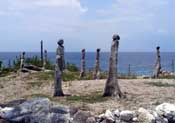Bahamas Travel Review

The 700 island chain of the Bahamas, which lies southeast of Florida in the Atlantic ocean, has a wild and varied history - one of pirates, colonial-era trade, slaves, rumrunners and villains (1600's -1800's). More recently the sport fishing and drinking exploits of Ernest Hemingway (1940's - 1950's) and even Jimmy Buffet (1970's - present). The Bahamas is a Commonwealth, an independent country - but the nation was under British Colonial rule for over 300 years. Today, the Bahamas is a popular destination for vacationers seeking warm climates, water sports and a laid- back friendly place to vacation.
Bahamas History
Originally the home of the Lucayan Indians from around the 6th century, the island chain was visited by Christopher Columbus on his maiden voyage, when he landed on the island of San Salvador. The major islands within the chain are New Providence (which has the capital of Nassau), Grand Bahama (which has the major tourist mecca of Freeport), Andros Island (known for oceanographic and geologic studies), Abaco, Great Exuma, Eleuthera, San Salvador, Cat Island, Rum Cay, Long Island, Crooked Island, Aikilins Island, Mayguana and Great Inagua. Between these stand hundreds of smaller islands - literally "dots" in the Atlantic, which hold very small populations, often under 500 persons.Three years after Columbus' landing, the Spanish established the first settlement and the local Lucayans (who had subsisted by fishing and harvesting shellfish, conch and lobster) became enslaved to be transported to Hispaniola (Haiti/Dominican Republic). The slave trade lasted over two hundred years. Due to its location between the Caribbean and Eastern Europe, the Bahamas became a thoroughfare for shipping. Due to the numerous coral reefs in the area, many ships laden with treasure and other cargo became stranded or sank in the shallow waters. Thus began the era of the pirates - 'privateers' who held up free sailing ships and looted them for their valuable cargo. The most famous pirate was Edward Teach - better known as Blackbeard - who made himself the magistrate until the Treaty of Utrecht in 1713 outlawed pirate activity. The British themselves had previously supported such activity from the early 1600's when King Charles I had claimed domain over the islands and allowed British privateers to assert their control of the region. The British Crown outlawed the slave trade in 1807 and the Royal Navy started depositing freed slaves there.
For most of the 19th century the Bahamas functioned largely as a center for fishing, smuggling, "wrecking" (reclaiming shipwrecks) and subsistence agriculture. At the turn of the 20th century, Florida started attracting thousands of tourists and vacationers who found the area ideal due to the mild climate and natural beauty. The Bahamas got more attention at this time - and when Prohibition was enacted in 1919, the islands became a busy shipping point for illicit alcohol. The repeal of Prohibition in 1933 caused a major economic downturn for the Bahamas, which worsened greatly during the Depression.
In the 1940's and 1950's, the Bahamas started gaining more attention from wealthy clientele who enjoyed the mild climate, beautiful surroundings and superb sport fishing. Ernest Hemingway wrote about Bimini in his posthumously published book "Islands in the Stream", mentioning the local bar The Compleat Angler - which sadly burned down in 2006. In recent decades Paradise Island (adjacent to New Providence Island) has become a tourist hotspot with the Atlantis resort and casino, bringing in thousands of people each month. More Bahama history...
